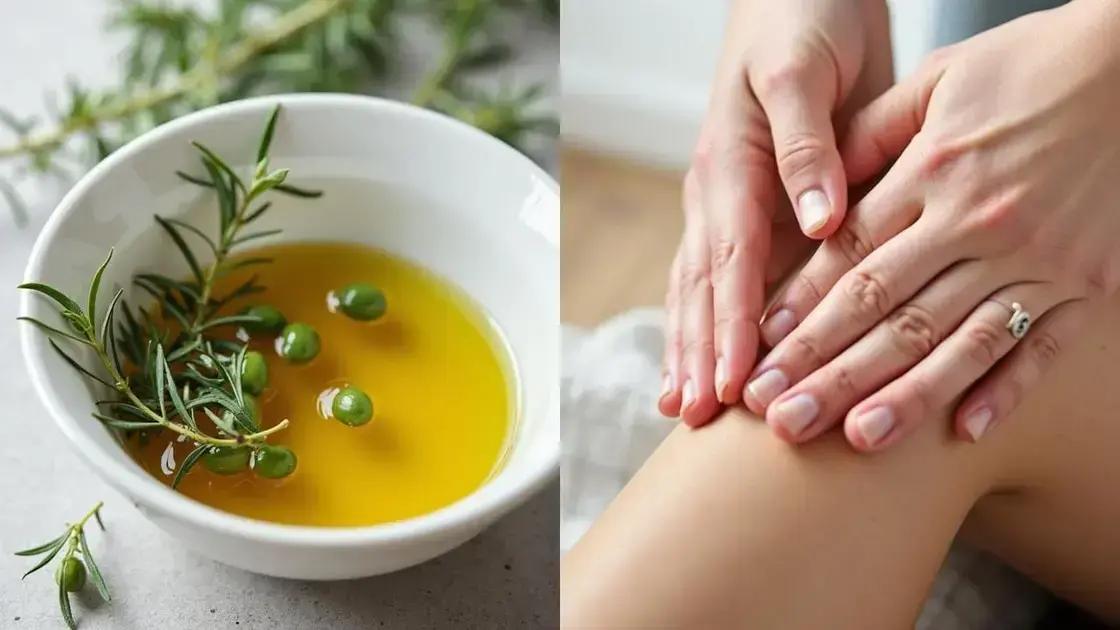Olive oil is a powerful ingredient for promoting heart and joint health. Rich in monounsaturated fats, antioxidants, and anti-inflammatory properties, it can help lower bad cholesterol, reduce inflammation, and support overall wellness. Incorporating olive oil into your diet through salad dressings, cooking, and various delicious recipes is an effective way to benefit from its health advantages.
Olive oil is more than just a cooking ingredient; it’s a powerhouse for your heart and joints. Rich in healthy fats and antioxidants, using olive oil can enhance your overall health. In this post, we will uncover the amazing health benefits of olive oil, explaining how it supports heart health and alleviates joint pain. Join us as we explore practical tips and delicious recipes to incorporate olive oil into your daily routine.
The Health Benefits of Olive Oil

Olive oil is celebrated for its rich flavor and versatility, but it also offers a myriad of health benefits. Studies reveal that incorporating olive oil into your diet can lead to reduced risk of various diseases, making it a key component of a healthy lifestyle.
Rich in Antioxidants
Extra virgin olive oil is packed with antioxidants that combat oxidative stress in the body. These antioxidants, like vitamin E and phenolic compounds, protect your cells from damage and promote wellness.
Heart Health Benefits
Olive oil is essential for heart health. It contains monounsaturated fats, which can lower bad cholesterol levels while raising good cholesterol. This can reduce the risk of heart disease and stroke. The Mediterranean diet, which is high in olive oil, has been linked to improved heart health in numerous studies.
Anti-Inflammatory Properties
Chronic inflammation is a contributing factor to many diseases, including arthritis. Olive oil contains oleocanthal, a compound with anti-inflammatory properties that may help reduce pain and inflammation in joints, making it a natural remedy for those suffering from arthritis.
Weight Management
Using olive oil in your diet may aid in weight management. The healthy fats in olive oil can help you feel satiated, which may reduce overall calorie intake. It also promotes the absorption of nutrients and may assist in proper digestion.
Incorporating olive oil regularly can provide these incredible benefits and improve overall health. From heart support to joint relief, it’s a simple addition to any meal.
How Olive Oil Supports Heart Health

Olive oil plays a crucial role in supporting heart health through several key mechanisms. Its unique composition of fatty acids and antioxidants makes it a heart-friendly choice for cooking and dressing.
Heart-Healthy Fats
One of the most significant contributors to heart health in olive oil is its high content of monounsaturated fats. These fats help reduce LDL cholesterol, which is known as “bad” cholesterol while boosting HDL cholesterol, or “good” cholesterol. This balance lowers the risk of heart disease.
Rich in Antioxidants
Olive oil also contains powerful antioxidants, such as oleuropein and hydroxytyrosol, which combat oxidative stress in the body. This reduction in oxidative stress contributes to overall cardiovascular health by preventing the buildup of plaque in the arteries.
Anti-Inflammatory Effects
Chronic inflammation can lead to various heart conditions, and olive oil has strong anti-inflammatory properties. The compound oleocanthal in olive oil acts similarly to ibuprofen in reducing inflammation, which can help maintain healthy blood vessels and support heart function.
Improved Blood Pressure
Regular consumption of olive oil can lead to lower blood pressure levels. Studies show that a diet rich in olive oil can help people with hypertension manage their blood pressure more effectively. The Mediterranean diet, which includes ample olive oil, is often recommended for those seeking to improve heart health.
By incorporating olive oil into your meals, you can take a proactive approach to heart health. Whether drizzled over salads, used in cooking, or as a dip, olive oil is a simple yet effective way to support a healthier heart.
Joint Health and Olive Oil: What to Know

Joint health is vital for maintaining mobility and overall quality of life. Olive oil can play a significant role in promoting joint health due to its anti-inflammatory properties and beneficial nutrients.
Anti-Inflammatory Benefits
Incorporating olive oil into your diet can help reduce inflammation in the joints. The compound oleocanthal found in olive oil has been shown to have similar effects as ibuprofen, making it an excellent natural option for those suffering from joint pain or arthritis.
Omega-3 Fatty Acids
While olive oil is primarily known for its monounsaturated fats, it also contains a small amount of omega-3 fatty acids, which are essential for joint health. These fatty acids are crucial for reducing inflammation and supporting overall joint function.
Rich in Antioxidants
Olive oil is rich in antioxidants, which help protect your joints from damage caused by oxidative stress. These antioxidants, such as vitamin E and polyphenols, can enhance joint health by reducing the risk of degenerative diseases that affect the joints over time.
How to Use Olive Oil for Joint Health
To effectively incorporate olive oil into your diet for joint health, consider adding it to salad dressings, marinades, or drizzling over vegetables. It can also be used for cooking at low to medium heat to preserve its beneficial properties. Combining olive oil with herbs like turmeric or ginger can further enhance its anti-inflammatory effects.
By understanding the positive impact of olive oil on joint health, you can make better dietary choices that support your mobility and comfort.
Delicious Recipes to Incorporate Olive Oil

Incorporating olive oil into your meals is an easy way to enjoy its health benefits while enhancing flavor. Here are some delicious recipes to try:
1. Olive Oil and Lemon Salad Dressing
Combine 1/4 cup of olive oil, 2 tablespoons of lemon juice, a pinch of salt, and black pepper to taste. Whisk together and drizzle over your favorite salad for a fresh taste.
2. Olive Oil Roasted Vegetables
Preheat your oven to 425°F. Toss chopped vegetables such as carrots, bell peppers, and zucchini with 2 tablespoons of olive oil, salt, and herbs. Roast for 20-25 minutes until golden and tender.
3. Garlic and Olive Oil Pasta
Cook 8 oz of whole wheat pasta until al dente. In a pan, heat 2 tablespoons of olive oil and sauté 3 minced garlic cloves until fragrant. Toss in the cooked pasta and add parsley and cheese to taste.
4. Olive Oil Dipping Sauce
Mix 1/2 cup of olive oil, 2 tablespoons of balsamic vinegar, and a sprinkle of Italian herbs. Serve with fresh bread for dipping.
5. Mediterranean Quinoa Bowl
Cook 1 cup of quinoa and let it cool. Add diced cucumbers, cherry tomatoes, olives, and feta cheese. Drizzle with 2 tablespoons of olive oil and lemon juice. Toss to combine.
By adding delicious olive oil recipes to your meals, you not only enhance taste but also promote heart and joint health.
Incorporating Olive Oil into Your Health Journey
Using olive oil as part of your everyday diet can lead to significant improvements in both heart and joint health. With its rich array of antioxidants, healthy fats, and anti-inflammatory properties, olive oil stands as a vital ingredient for overall wellness.
From salad dressings to cooking methods, there are countless ways to include this golden oil in your meals. Embracing delicious recipes allows you to enjoy not only the flavors but also the health benefits that come along with them.
By making simple changes and focusing on quality ingredients like olive oil, you can take proactive steps toward a healthier lifestyle.
Ultimately, the journey to better health begins in the kitchen, and olive oil can be your ally along the way.
FAQ – Frequently Asked Questions about Using Olive Oil for Health
What are the health benefits of olive oil?
Olive oil is rich in monounsaturated fats and antioxidants, which can lower cholesterol, reduce inflammation, and support heart and joint health.
How can I incorporate olive oil into my diet?
You can use olive oil in salad dressings, for cooking vegetables, drizzling over pasta, and as a dipping sauce for bread.
Is olive oil good for heart health?
Yes, olive oil promotes heart health by improving cholesterol levels and reducing the risk of heart disease due to its healthy fats and antioxidants.
Can olive oil help with joint pain?
Olive oil contains oleocanthal, which has anti-inflammatory properties that may help alleviate joint pain and improve mobility.
How should I store olive oil?
Store olive oil in a cool, dark place, away from heat and light, to preserve its freshness and health benefits.
What type of olive oil should I use?
Extra virgin olive oil is the highest quality and contains the most beneficial nutrients, making it the best choice for health benefits.












